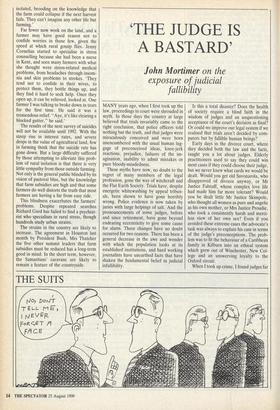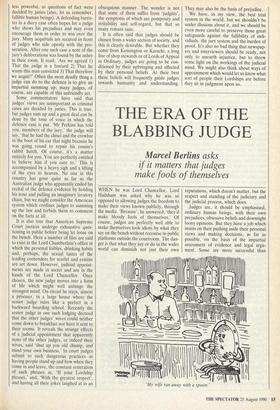'THE JUDGE IS A BASTARD'
John Mortimer on the
exposure of judicial fallibility
MANY years ago, when I first took up the law, proceedings in court were shrouded in myth. In those days the country at large believed that trials invariably came to the right conclusion, that police officers told nothing but the truth, and that judges were miraculously conceived and were born unencumbered with the usual human lug- gage of preconceived ideas, knee-jerk reactions, prejudice, failures of the im- agination, inability to admit mistakes or pure bloody-mindedness.
These myths have now, no doubt to the regret of many members of the legal profession, gone the way of witchcraft and the Flat Earth Society. Trials have, despite energetic whitewashing by appeal tribun- als, been shown to have gone horribly wrong. Police evidence is now taken by juries with large helpings of salt. And the pronouncements of some judges, before and since retirement, have gone beyond endearing eccentricity to give some cause for alarm. These changes have no doubt occurred for two reasons. There has been a general decrease in the awe and wonder with which the population looks at its established institutions, and hard working journalists have unearthed facts that have shaken the fundamental belief in judicial infallibility. Is this a total disaster? Does the health of society require a blind faith in the wisdom of judges and an unquestioning acceptance of the court's decision as final? Or could we improve our legal system if we realised that trials aren't decided by com- puters but by fallible human beings?
Early days in the divorce court, where they decided both the law and the facts, taught you a lot about judges. Elderly practitioners used to say they could win most cases if they could choose their judge, but we never knew what cards we would be dealt. Would you get old Savonarola, who disapproved of divorce anyway, or Mr Justice Falstaff, whose complex love life had made him far more tolerant? Would you be dealt little Mr Justice Skimpole, who thought all women as pure and angelic as his own mother, or Mrs Justice Proudie, who took a consistently harsh and merci- less view of her own sex? Even if you avoided these extreme cases the advocate's task was always to explain his case in terms of the judge's preconceptions. The prob- lem was to fit the behaviour of a Caribbean family in Kilburn into an ethical system which grew out of Winchester, New Col- lege and an unswerving loyalty to the Oxford circuit.
When I took up crime, I found judges far less powerful, as questions of fact were decided by juries (also, let us remember, fallible human beings). A defending barris- ter in a dicey case often hopes for a judge who shows his prejudices and may even encourage them in order to win over the jury. Many acquittals are secured in front of judges who side openly with the pro- secution. After one such case a note of the jury's deliberations was found by the usher in their room. It read, 'Are we agreed 1) That the judge is a bastard 2) That he wants this man convicted 3) That therefore we acquit?' Often the most deadly thing a judge can do to the defence is to give an impartial summing up; many judges, of course, are capable of this unfriendly act.
Some commentators have said that judges' views are unimportant as criminal cases are decided by juries. This is true, but judges sum up and a great deal can be done by the tone of voice in which the defence case is put. `Mr Perkins has told you, members of the jury,' the judge will say, 'that he had the chisel and the crowbar in the boot of his car that night because he was going round to repair his cousin's rabbit hutch. Of course, it's a matter entirely for you. You are perfectly entitled to believe him if you care to.' This is accompanied by a heavy sigh and a lifting of the eyes to heaven. No one in this country has gone quite as far as the Australian judge who apparently ended his recital of the defence evidence by holding his nose and pulling an imaginary lavatory chain, but we might consider the American system which confines judges to summing up the law and forbids them to comment on the facts at all.
It is also true that American Supreme Court justices undergo exhaustive ques- tioning in public before being let loose on the bench. Here a number of files are said to exist in the Lord Chamberlain's office in which the personal foibles, drinking habits and, perhaps, the sexual tastes of the leading contenders for scarlet and ermine are set down. However, judicial appoint- ments are made in secret and are in the hands of the Lord Chancellor. Once chosen, the new judge moves into a form of life which might well unhinge the strongest mind. On circuit he stays, almost a prisoner, in a large house where the senior judge rules like a prefect in a backward boarding school. Recently the senior judge in one such lodging decreed that the other judges' wives could neither come down to breakfast nor have it sent to their rooms. It reveals the strange effects of a judicial appointment that apparently none of the other judges, or indeed their wives, said 'shut up you old chump, and mind your own business.' In court judges submit to such dangerous practices as having people stand up and bow when they come in and leave, the constant reiteration of such phrases as, 'If your Lordship pleases,' and, 'With the greatest respect', and having all their jokes laughed at in an obsequious manner. The wonder is not that some of them suffer from `judgitis', the symptoms of which are pomposity and irritability and self-regard, but that so many remain sane.
It is often said that judges should be chosen from a wider section of society, and this is clearly desirable. But whether they come from Kensington or Karachi, a long line of shop stewards or of Lords of Appeal in Ordinary, judges are going to be con- ditioned by their upbringing and affected by their personal beliefs. At their best these beliefs will frequently guide judges towards humanity and understanding. They may also be the basis of prejudice.
We have, in my view, the best trial system in the world, but we shouldn't be under illusions about it, and we should be even more careful to preserve those great safeguards against the fallibility of indi- viduals, the jury system and the burden of proof. It's also no bad thing that newspap- ers and interviewers should be ready, not only to unearth injustice, but to throw some light on the workings of the judicial mind. We might also think about ways of appointment which would let us know what sort of people their Lordships are before they sit in judgment upon us.











































 Previous page
Previous page